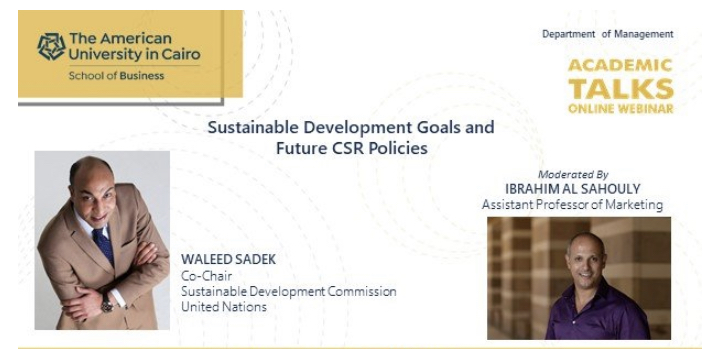Implementing Corporate Social Responsibility During the Pandemic
By: Farida ElSirgany
@FSirgany
Photo Credit: AUC Connect
The pandemic’s effect on people and societies’ has spurred many corporations to change their current business models to ones that can better financially support the communities they serve.
This merging of social welfare with corporate strategy is known as Corporate Social Responsibility (CSR).
According to the World Business Council for Sustainable Development, CSR is a business’ commitment and contribution to economic development. It aims to improve the quality of life of the workforce, their families and that of the local community and society at large.
“CSR is a creative process. One that needs imaginative people to generate ideas and develop them successfully,” said Waleed Sadek, co-chair of the United Nations Sustainable Development Commission.
The challenge for marketers during the pandemic is “reflecting positive values” and maintaining tactfulness and empathy towards the situation while learning to adapt to the “new normal”.
Sadek gave the example of Puma, an athletic footwear and apparel manufacturer, changing their slogan from “We Are Forever Faster” to “Stronger Together” during the pandemic.
Though CSR is not a requirement for any business, many marketers have used the current pandemic as an opportunity to give back to the community and establish a positive brand image.
The American clothing brand Sisters, for example, gives away a free reusable mask with each order.
It is also important to note that CSR is a corporate strategy. This means that it is performed with the expectation that there will be some form of return to the company.
Businesses giving out free masks with purchases do so in the hopes of increasing sales and establishing a positive brand image alongside the promotion of public health safety.
There is a common misconception that CSR is simply companies being philanthropic or charitable.
Hamed Shamma, associate professor at the department of Management, told The Caravan that thinking of CSR in such terms is limiting. Donations, giveaways and promotions are, in his view, easy, short-term and unsustainable solutions.
The new model of CSR focuses on sustainable development by looking for long-term solutions for the community. This could take form in building schools, improving access to clean water, and contributing to green technology advancement.
An example of this would be Samsung’s education initiative.
Since 2018, Samsung has been developing and supplying schools in Upper Egypt with tablets, PCs and other devices.
Their aim with this endeavour is to improve the education quality in Upper Egypt and create better prospects for the students there. Samsung has also supported medical research by establishing sonar labs in Mansoura, Cairo, Alexandria and Ain Shams universities.
During the event, concerns were raised on CSR being used as a means of manipulating public opinion as its contributions to public well-being are done with the objective of corporate gain.
When presented with these concerns, Shamma responded by outlining the layers of CSR and company priorities.
A company’s first responsibility is towards its economic prosperity without which it would not function. Second, a company must satisfy its legal responsibilities by complying with all the relevant laws and regulations. Third, comes the company’s responsibility to its employees. Lastly, a company can fulfill its social responsibility.
Shamma told The Caravan that CSR provides a “win-win” situation as it balances a company’s objectives for profit and brand-building while solving problems in the community.




